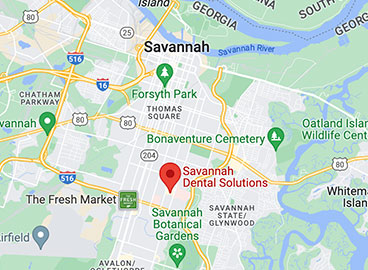What is TMJ?
TMJ, or temporomandibular joint disease, is a complex, potentially serious, and often overlooked medical condition. The temporomandibular joint is what allows your jawbone to move smoothly. TMJ prevents that smooth movement, causing the jaw to click, stick, or pop.
Treatment generally focuses on correcting any underlying conditions and realigning the bite through a variety of methods. While you are undergoing treatment, lifestyle changes such as choosing soft foods and intentionally relaxing your facial, jaw, and neck muscles can help alleviate pain.
TMJ Treatment at Savannah Dental Solutions
Signs of TMJ disorders may include:
- Pain or tenderness of your jaw
- Aching pain in and around your ear
- Difficulty chewing or discomfort while chewing
- Aching facial pain
- Locking of the joint, making it difficult to open or close your mouth
- Clicking sound or grating sensation when opening your mouth or chewing.
Painful disorders of the TMJ can happen if:
- The disk erodes or gets moved out of alignment
- Cartilage is damaged
- A sudden blow or impact compromises the function of the joint
Schedule the First Step Toward Your Healthiest Smile


